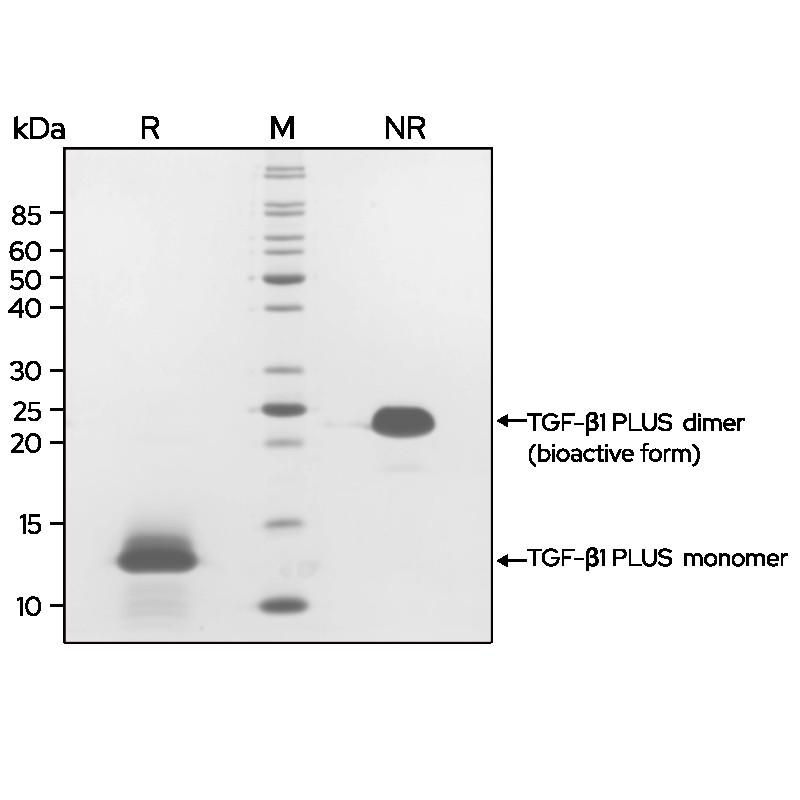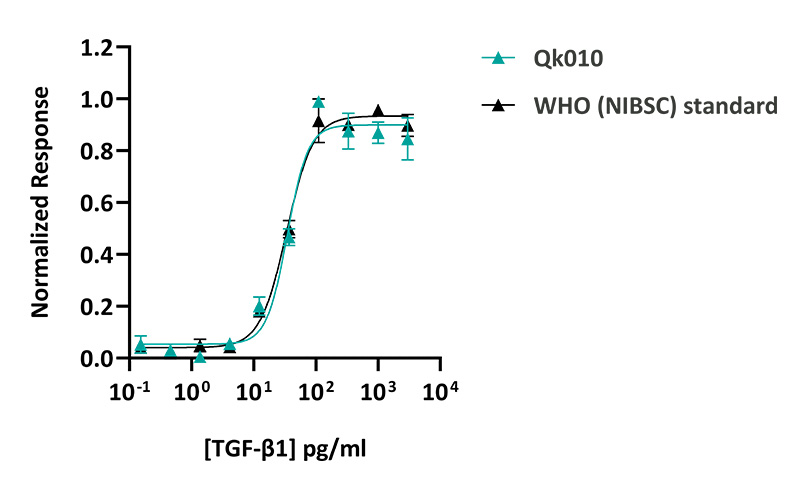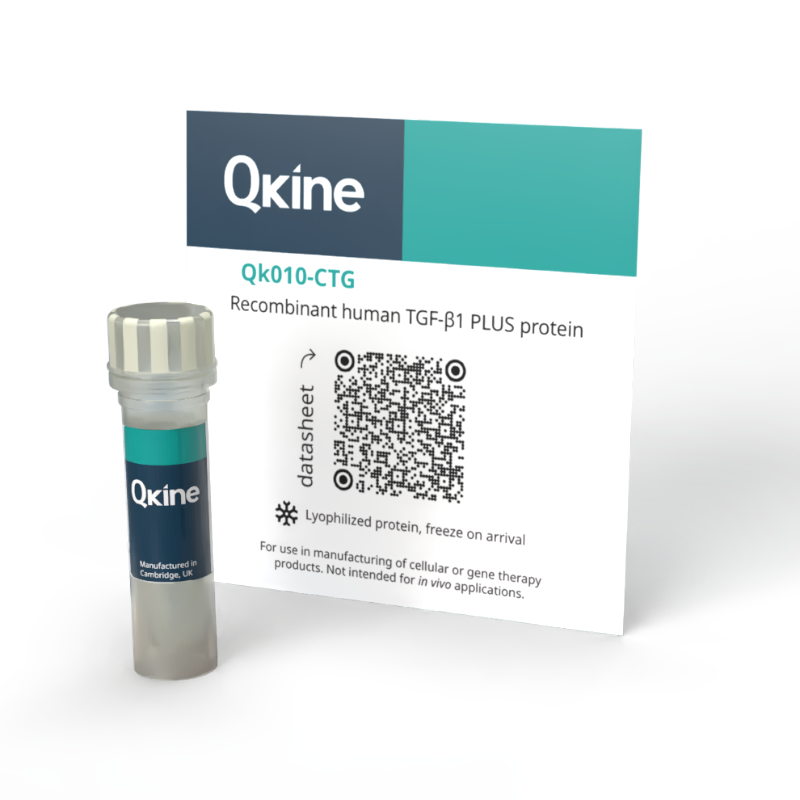 Recombinant human TGF-β1 PLUS™ protein (Qk010-CTG)
Recombinant human TGF-β1 PLUS™ protein (Qk010-CTG)Recombinant human TGF-β1 PLUS™ protein (Qk010-CTG)
Price range: £5,060.00 through £7,920.00
Transforming growth factor-beta 1 (TGF-β1) is a pleiotropic cytokine that regulates various cellular processes, including cell proliferation, growth, differentiation, motility, and apoptosis. It is an essential growth factor in many embryonic and induced pluripotent stem cell (iPSC) maintenance media and promotes the differentiation of various cell types such as fibroblasts, epithelial cells, and immune cells. In cell therapy TGF-β1 is used in the maintenance of iPSC-derived cell therapy and in the induction of iTregs from naïve T cells.
Qkine human cell therapy grade TGF-β1 PLUS™ protein is the first entirely animal origin-free recombinant human TGF-β1 protein for increased safety and purity for translational research and cell and gene therapy manufacturing.
Qkine cell therapy grade high purity animal origin-free proteins are manufactured as GMP grade equivalents in an ISO 9001:2015-certified facility, under ISO 20399:2022 standards with GMP compliance, defined quality criteria and documentation.
In stock
Orders are typically shipped same or next day (except Friday).
Easy world-wide ordering, direct or through our distributors.
Price range: £5,060.00 through £7,920.00
Buy online with secure credit card or purchase order. For any questions, please email orders@qkine.com
Summary:
- High purity optimized TGF-β1 protein (Uniprot: P01137)
- 24 kDa (dimer)
Certified animal origin-free (AOF)
Cell and gene therapy grade
Manufactured in our ISO 9001:2015 facility in Cambridge, UK
Lot-to-lot consistency in bioactivity
Full traceability and documentation
Carrier protein-free, tag free
Expressed in E. coli
Lyophilized from acetonitrile, TFA
- Resuspend in 10 mM HCl (Reconstitution solution A) at >50 µg/ml, add carrier protein if desired, prepare single-use aliquots and store frozen at -20 °C (short-term) or -80 °C (long-term)
Featured applications:
Induction of iTregs from naïve T cells
Regenerative stem cell therapy
CAR-T cell therapy manufacturing

Recombinant TGF-β1 PLUS™ activity was determined using a CAGA luciferase reporter assay in transiently transfected HEK293 cells. Transfected cells were treated in triplicate with a serial dilution of TGF-β1 PLUS™ for 6 hours. Firefly activity was measured and normalized to the control Renilla luciferase activity. Data from Qk010-CTG lot #204762. EC50 = 35 pg/ml (1.46 pM).
The specific activity of cell therapy grade TGF-β1 PLUS™ Qk010-CTG is 1.0 x 107 IU/mg, which is calibrated against the human TGF-β1 WHO standard (NIBSC code: 89/514).
TGF-β1 PLUS™ (Qk010) dimer migrates as a single band at 24 kDa in non-reducing (NR) and 13 kDa as a single monomeric species upon reduction (R). High purity yield of dimeric protein (bioactive form). Purified recombinant protein (7 μg) was resolved using 15% w/v SDS-PAGE in reduced (+β-mercaptoethanol, R) and non-reduced conditions (NR) and stained with Coomassie Brilliant Blue R250. Data from Qk010 lot #012.

Further quality assays
Mass spectrometry: single species with expected mass
Purity >98%, by SDS-PAGE quantitative densitometry
Recovery from stock vial: >95%
Sterility tested and mycoplasma negative
Endotoxin: <0.05 EU/μg protein
Residual host cell protein <10 ng/µg
Residual host cell DNA <10 ng/μg
N-terminal sequence analysis
We are a company founded and run by scientists to provide a service and support innovation in stem cell biology and regenerative medicine. All our products are exceptionally high purity, with complete characterisation and bioactivity analysis on every lot.

Qkine TGF-β1 PLUS™ was as bioactive as the WHO (NIBSC) standard TGF-β1. TGF-β1 PLUS™ activity was determined using a CAGA luciferase reporter assay in transiently transfected HEK293 cells. Transfected cells were treated in triplicate with a serial dilution of TGF-β1 PLUS™ for 6 hours. Firefly activity was measured and normalized to the control Renilla luciferase activity. Qk010 #204560 EC50 = 35 pg/ml (1.46 pM), WHO (NIBSC) EC50 = 34 pg/ml.
Protein background
Transforming growth factor-beta 1 (TGF-β1) is a pleiotropic cytokine part of the TGF-β superfamily. TGF-β1 regulates various cellular processes, including cell proliferation, growth, differentiation, motility, and apoptosis [1]. It plays a crucial role in the immune response, tissue repair, and the epithelial-mesenchymal transition. Transforming growth factor-beta 1 is produced by various cell types, including immune cells, fibroblasts, and epithelial cells. It is synthesized and secreted as an inactive or latent complex, associated with latency-associated proteins (LAP), and targeted to the extracellular matrix [2]. It is released from latency by TGF-β activators including plasmin, matrix metalloproteases, integrins. Once the LAP cleaved, the mature transforming growth factor-beta 1 is a homodimeric protein composed of two identical subunits linked by a disulfide bond. Its amino acid sequence is composed of 390 amino acids. TGF-β1 signals through complexes of cell surface receptors including TGF-βRII/TGF-βRI and ALK-5/ALK-1. This triggers downstream signaling cascades, such as the Smad-dependent and Smad-independent pathways.
In cell culture, recombinant TGF-β1 protein is an essential growth factor in many embryonic and induced pluripotent stem cell maintenance media, including the commonly used chemically-defined E8, StemPro, and mTeSR medias [3–5]. Transforming growth factor-beta 1 supports the survival and maintenance of pluripotency of stem cells [1]. TGF-β1 is used to promote the differentiation of various cell types such as fibroblasts, epithelial cells, and immune cells. It is used in combination with other growth factors such as BMP-2 to regulate bone marrow stromal cell differentiation or with IL-2 and IL-6 to regulate T reg and Th17 cells differentiation [6–8].
For cell therapy applications, TGFβ induces the conversion of naïve CD4+ T cells into iTregs [9]. Transfer of iTregs has been shown to prevent the development of autoimmune disease in several models as well as help promote transplantation tolerance [10, 11]. iTregs have therapeutic potential in many indications including asthma, diabetes, inflammatory bowel disease, multiple sclerosis, cancer and inflection [11].
To date, recombinant human TGF-β1 has only been produced from mammalian cell protein expression systems (HEK or CHO), where endogenous protein contaminants, cost and animal-free status is a challenge. As part of the ongoing mission to redefine industry standards for growth factor and cytokine biochemical quality, Qkine introduced the first optimized, animal-free, and highly bioactive recombinant human TGF-β1.
Additional resources
FAQ
It is an essential growth factor in many embryonic and induced pluripotent stem cell maintenance media, including the commonly used E8, StemPro, and mTeSR media. TGF-β1 also promotes the differentiation of various cell types such as fibroblasts, epithelial cells, and immune cells.
TGF-β1 is synthesized and secreted in an inactive or latent form. It is activated through cleavage and binding to matrix metalloproteinases, integrins, extracellular matrix such as thrombospondin-1, but also pH changes and reactive oxygen species.
Dysregulation of TGF-β1 signaling is associated with various diseases such as cancer, fibrosis, autoimmune, cardiovascular, neurological, and chronic kidney diseases.
TGF-β1 is a multifunctional cytokine that plays a crucial role in various cellular processes. It regulates cell growth, differentiation, proliferation, migration, and apoptosis. It is also involved in the immune response, epithelial-mesenchymal transition, and the extracellular matric synthesis and modelling.
Elevated levels of TGF-β1 in the human body can have different implications such as higher risks of fibrosis, cancer progression, chronic inflammation, and cardiovascular diseases. It is important to consider the specific clinical context, the presence of other biomarkers, and the patient’s prognosis.
It is a member of the transforming growth factor-beta superfamily of cytokines that are synthesized as latent complexes. TGF-β1 requires further processing to become the biologically active, mature TGF-β1.
TGF beta family proteins and other growth factors can be very poorly soluble in physiological solutions. Please follow the handling guidance for lyophilized cytokines below to minimize loss of protein due to precipitation or adsorption to plastic. We advise storing the recombinant protein at very low pH before dilution in cell culture media or final working solutions. Low pH will also assist in maintaining the correct disulfide structure of the protein by minimizing disulfide bond exchange reactions.
- Resuspension in physiological buffers may cause precipitation of stock solutions, hence we recommend dissolving our lyophilized cytokines in 10 mM HCl (1:1000 dilution of concentrated HCl) while keeping the protein concentration at 50 µg/ml or above, in order to avoid loss by adsorption to plasticware.
- To ensure you recover all of the protein, let the sample sit for a few minutes with the solubilization buffer at room temperature and pipette gently up and down (avoid foaming).
- Rinse the tube with some more 10 mM HCl and pool with the rest.
- The protein is tolerant of some freeze and thaw cycles, but as always with proteins, it is better to aliquot and store frozen.
- Our proteins are supplied carrier-protein free. If compatible with your work, add carrier protein of your choice such as BSA, HSA or gelatin to further minimize loss by adsorption.
- Store in -80°C for long term storage. -20°C for short-term.
Every effort is made to ensure samples are sterile; however, we recommend sterile filtering after dilution in media or the final working solution.
Our products are for research use only and not for diagnostic or therapeutic use. Products are not for resale.
For use in manufacturing of cellular or gene therapy products. Not intended for in vivo applications.

Receive an Amazon gift voucher when you leave us a review.
£25, $30 or €30 for reviews with an image and £10, $15 or €15 for reviews without an image

